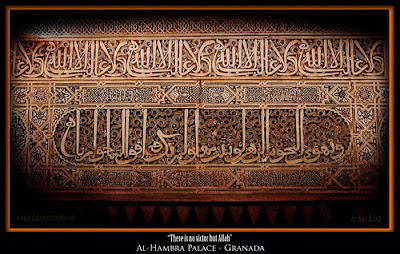2010/06/13
The Right Path to God
2010/06/09
know muhammad
 Do you know that:
Do you know that:Prophet Mohammed was born orphan, his mother died six years later at his father's grave, he was brought up by his uncle who died and then his uncle took care of him
2010/06/07
2010/06/01
Surprise To every Muslim and a Christian and a Jew
2010/05/29
Purify yourself
From now on, let us take a step forward in our way to Allah by performing a good deed; and do not belittle any good deed.
Take it step by step till you reach your ultimate goal.
Starting from today abide by being in the state of purity. Perhaps Allah would bestow upon you with inner purity as well as the outer one.” And purify your garments!” (Al-Muddathir)
It’s been narrated by Ahmed and Ibn Majjah and classified as correct by Al-Albany that the prophet (May peace and blessings be upon him) said:
“And only a (true) Mu’min (Believer) maintains the Wudu’ (ablution)”
So when ever you break your wudu’ hasten to perform it again to achieve the status of (Only a true Mu’min)
Remember: Ramadan will be there within 74 days
Written by: sheikh Hany helmy
he is the messenger of Allah
2010/05/19
Discover Islam CD
 http://www.islamhouse.com/p/156575
http://www.islamhouse.com/p/156575
Discover Islam CD
From issues : Islamic Propagation Office in Rabwah
http://d1.islamhouse.com/data/en/ih_disks/en_CD_for_non-Muslims/en_CD_for_non-Muslims-part1.rar
http://d1.islamhouse.com/data/en/ih_disks/en_CD_for_non-Muslims/en_CD_for_non-Muslims-part2.rar
http://d1.islamhouse.com/data/en/ih_disks/en_CD_for_non-Muslims/en_CD_for_non-Muslims-part3.rar
http://d1.islamhouse.com/data/en/ih_disks/en_CD_for_non-Muslims/en_CD_for_non-Muslims-part4.rar
http://d1.islamhouse.com/data/en/ih_disks/en_CD_for_non-Muslims/en_CD_for_non-Muslims-part5.rar
http://d1.islamhouse.com/data/en/ih_disks/en_CD_for_non-Muslims/en_CD_for_non-Muslims-part6.rar
http://d1.islamhouse.com/data/en/ih_disks/en_CD_for_non-Muslims/en_CD_for_non-Muslims-part7.rar
http://rapidshare.com/files/324512867/en_CD_for_non-Muslims-part1.rar http://rapidshare.com/files/324513212/en_CD_for_non-Muslims-part2.rar http://rapidshare.com/files/324513255/en_CD_for_non-Muslims-part3.rar http://rapidshare.com/files/324512639/en_CD_for_non-Muslims-part4.rar http://rapidshare.com/files/324513322/en_CD_for_non-Muslims-part5.rar http://rapidshare.com/files/324513012/en_CD_for_non-Muslims-part6.rar http://rapidshare.com/files/324513267/en_CD_for_non-Muslims-part7.rar
2010/05/18
a very important site
 Al Quran was revealed from Allah piecemeal to meet the needs and requirements of the Islamic Movement in its different stages. It is a divine guidance to humanity so that we can successfully reach our destiny - the Hereafter. Because of its divine origin, Al Quran in its original Arabic language does not have human authors.
Al Quran was revealed from Allah piecemeal to meet the needs and requirements of the Islamic Movement in its different stages. It is a divine guidance to humanity so that we can successfully reach our destiny - the Hereafter. Because of its divine origin, Al Quran in its original Arabic language does not have human authors.Al Quran is unique in its composition and style. Al Quran does not conform to the normal conception of a book. It is a book that is not like any book ever written. The chapters of Al Quran consist of verses that deal with a mixture of subjects and miscellaneous topics. It is for this reason that the title or name of a chapter would not reveal the total information and contents in that chapter. The information contained in a chapter of the Quran is woven together and laid down in a mosaic form that might give the feeling of lack of continuity and order. Interconnection between the verses and the continuity of the subject might not be apparent or existing. Varied information within the same verse can also be found. It is reasonable to think of a chapter of Al Quran as a beautiful flower bouquet, each of its flowers has its unique color and smell.
Thus, for one to understand Al Quran, one should first free the mind from the preconceived notion of a “regular” book, and then concentrate on grasping the meaning of each individual verse in the chapter. Verses that have obvious and clear connection should be studied together. After one reads a chapter more than once, one is able to comprehend all the important lessons in that chapter. It is important that, for deeper and more understanding of Al Quran, the reader should visit any index, commentary, or notes, if available in the translation.
It is difficult to understand the complete meaning and grasp all the wisdom of Al Quran after one reading. As a matter of fact, one needs to read Al Quran over and over again with complete concentration and meditation before one can fully discover its hidden treasures. Because you gain new meanings and perception each time you read Al Quran, you might feel as if you never read such verses before. Amazingly, these realities, about re-reading Al Quran often, hold true for all people regardless of their level of education. Fortunately, Allah rewards us generously for reading each and every letter of this great divine book.
He never sent me a bill
…and if you try to count the blessings of Allah, never will you be able to count them… {Surah Ibrahim}
2010/05/06
History of The Prophet of Islam

In or about the year 570 the child who would be named Muhammad and who would become the Prophet of one of the world’s great religions, Islam, was born into a family belonging to a clan of Quraish, the ruling tribe of Mecca, a city in the Hijaz region of northwestern Arabia.








